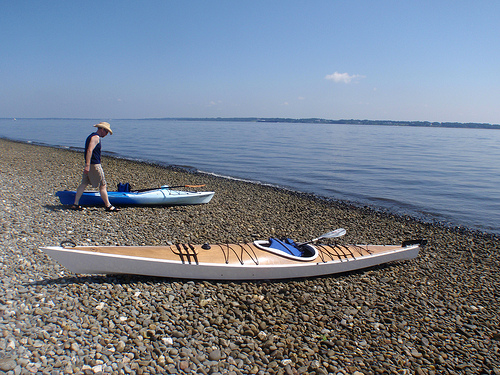Genius always gives its best at first; prudence, at last. – Seneca

While you may be a good swimmer, and the kayak appears unbreakable and unsinkable, prudence says to take the extra time to put on your life vest. Take caution.
What does that mean?
This quote is about the eternal battle between the bright idea, blurted out and the measured and thoughtful response, given after careful con-sideration.
This web page gives a massive lecture on the definition, use and value of prudence. It is quite an interesting read. However, they attribute this quote to a more recent person.
The point is that while it might be neat to show how smart you are, and to be first with the (seemingly) correct answer, it often works out that there is a better solution.
While there are times when expediency is required, when leisure is allowed, even a genius can benefit from a bit of prudence. How many times did Einstein double check his work prior to publishing it? Genius and prudence, a most excellent combination.
Why is caution important?
Caution, of course, is only one part of prudence. However, in my experience, it is the least represented in my generation, and the generation(s) which have followed. It seems the generations that fought in the World Wars had enough of caution, and went for it when they got out.
This example might be what influenced the subsequent generations to be a bit less cautious. That lack of caution has both benefits and drawbacks. It is up to each individual to strike a balance between too much and too little caution. But without some caution, it is hard to be prudent.
That doesn’t mean we abandon all flashes of genius. It just means that we might want to take a moment and consider all the aspects and possible effects that acting on the inspiration could have. There is even a street saying about it: “Check yourself before you wreck yourself.”
What I am getting at is that genius and prudence are not mutually exclusive, but live in balance with one another. At least that is what I get from this quote. And as always, the exact situation will tell you what is or is not prudent. Be aware, and adapt to what is going on around you.
Where can I apply this in my life?
That depends on where you tend to rush things. To me, this quote applies most closely to the parts of our lives where we sit down afterwards and say how dumb it was to have done whatever we did. That is a clear sign that, genius or not, we acted with less caution and prudence than we should have.
If mind altering substances are part of the equation on a regular basis, that might be something else to consider. That includes regrettable moments which start with the famous words “Hold my beer and watch this!” Right? Yes, we can still have a good time, but let’s learn to hold it in, OK?
So the question is where in your life do you tend to rush things, unnecessarily? That last word is the key. When you are driving and come over the top of a hill to see an oncoming car in the wrong lane, there isn’t time to consider at length the proper course of action, right?
There are times for quick or even less-than-cautions actions. But usually we have at least a little time to consider things, and to be somewhat prudent in our thoughts and then in our actions. When do you tend to get ahead of yourself, and get into situations which caution and prudence would have avoided?
So the question becomes how does one slow things down in those situations when time is available, but not used. Is there a rush because you have to be first? I’ve known people like that, and it is usually an ego thing. That is easy enough to work on, right?
Are you quick because the muscle between the brain and the mouth isn’t very well exercised? Both my kids, as well as myself, had this problem when young. We just blurted out the answers. Right or wrong, the muscle that kept words from flowing directly from brain to mouth wasn’t well developed.
Think about the last few times you were imprudent, and what factor or factors lead you to speak or act with less caution and prudence that was appropriate. Is there a pattern? Or is each one unique? What is the most damaging reason, or the one that results to the biggest difficulties?
Now all you have to do is come up with a way to interrupt that pattern. For me and blurting, we came up with the three-second rule. You had to count to three in your head before you could do anything. Other ideas might be to share your thoughts or ideas with a friend or co-worker. The discussion will take some time, and might lead to an improved solution.
We all have impulses. This quote is about learning to temper them with caution and prudence. All you have to do is learn to slow down just a little, when it is appropriate. Act quickly when quick is necessary, otherwise, be prudent.
From: Twitter, @philo_quotes
confirmed at : http://www.brainyquote.com/quotes/quotes/l/luciusanna162774.html
Photo by David Smith
Related articles
For some odd reason, my ‘related articles’ app is still face down in the mud. I hope to have something that works by early next week…







Nice post! =)
Thanks for the kind words, and for stopping by. Glad the post had some meaning for you. Hope to hear from you again.